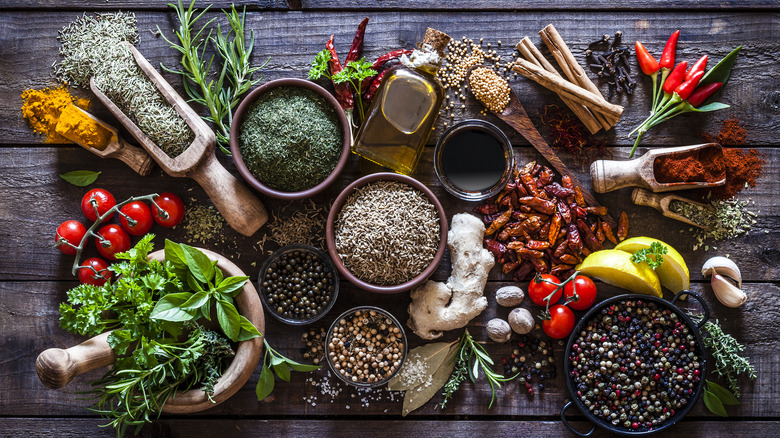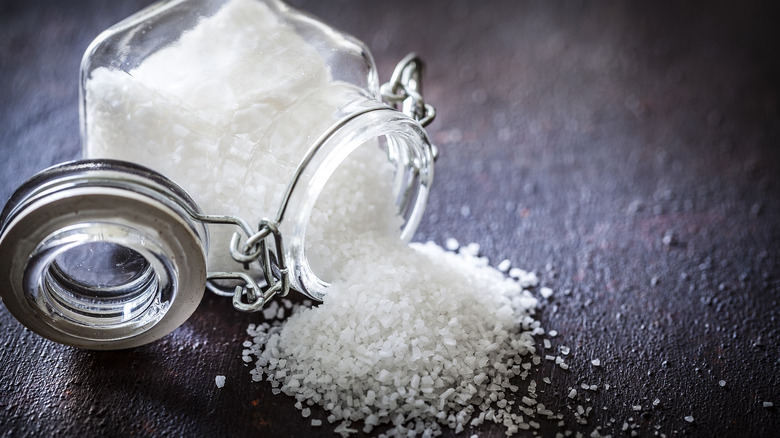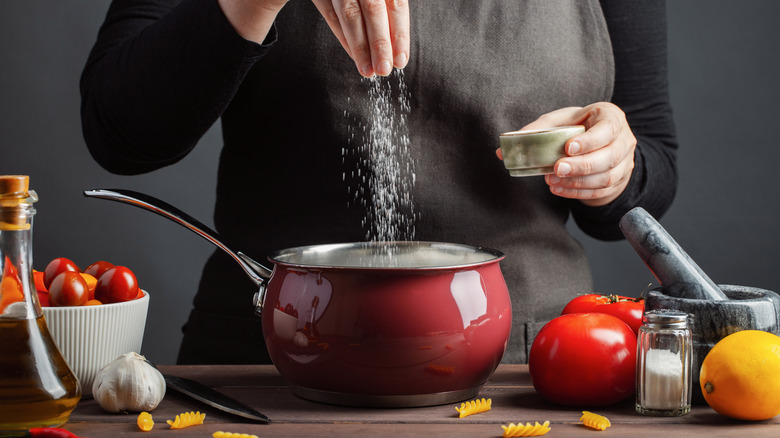Season Food Every Step Of The Way For The Best Tasting Dish
Since the beginning of human history, we have been using herbs and spices to make our food tastier. Centuries ago, people spent months crossing land and sea to get their hands on certain spices that became incredibly valuable. Fortunately for the modern cook, obtaining spices these days is as simple as a trip to the local grocery store. Whether it's a dash of salt over freshly popped popcorn or the masala medley required for proper Indian cuisine, good seasoning can elevate any dish, especially when incorporated properly.
If you look at practically any recipe, you'll notice that multiple steps instruct you to season the food. For example, in this recipe for creamy roasted tomato soup, seasoning is added both before the tomatoes are roasted and after they are blended up. It would be easy for anyone who makes this dish to question the need for multiple instances of seasoning, and to perhaps even skip the step if they are in a rush. However, this would be a mistake, because adding seasoning to your food throughout the cooking process is the key to fully flavored, delicious meals. Ensuring your food has enough salt, herbs, and spices will add new tastes to a dish while bringing out the food's natural flavors.
Adding enough seasoning is the key to dishes with depth
At the most basic level, seasoning food as you cook is the best way to avoid under-seasoned food. After all, a few shakes of garlic salt, black pepper, and paprika are often the difference between sad, pale, tasteless chicken and a meal you wouldn't mind eating a few times a week. Frequently adding herbs and spices to your cooking and tasting as you go lets you guarantee that you'll be satisfied with your final result. Especially when you're making something with many elements, like a stir fry, seasoning each component — such as the vegetables, protein, and noodles individually — will make everything taste better individually and as a complete dish.
One seasoning that is particularly beneficial when used throughout the cooking process is salt. This mineral brings out the flavor of various foods on a chemical level, enhancing sweet, savory, and salty foods alike; that's why a sprinkle of salt tastes just as good on ice cream as it does on a steak. Think of it this way: If you're making spaghetti with meatballs, thoroughly salting the pasta water and the ground beef guarantees that the rest of the dish will be built on a foundation that is as flavorful as possible.
Taste as you go
Almost every recipe you read will contain instructions along the lines of "season to taste." Regardless of what you're making, this simple direction is often the difference between a dish that you love, and one that's just so-so. As long as your food is cooked through and safe to eat, you should give it a taste at every step of the process, so that you can ensure the end product will meet your expectations. Tasting and adjusting flavors throughout the cooking journey also allows the chef to avoid over and under-seasoning.
If you're new to the world of seasoning, it could be helpful to taste various herbs and spices on their own to learn more about the unique flavors. Once you've trained your palate a bit, you'll be better at determining which exact seasoning would best serve a dish. Tasting and even smelling your seasonings frequently is a vital skill for chefs of any ability level and leads to harmonious, well-integrated flavors. This meticulous approach to seasoning transforms cooking from a mundane task into a creative endeavor, where you can use your palate to make dishes especially suited to your tastes.


